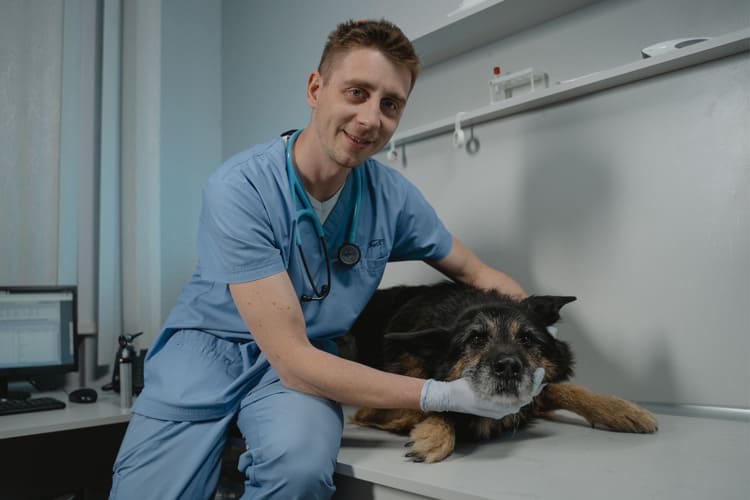I am a dog that loves going to the vet. I know it sounds strange as a visit to the vet triggers anxiety in most animals, but really what’s not to like. The people there smother me in attention, which I thrive off, giving me lots of pets and plenty of treats in exchange for the occasional prick with a needle that, in all honesty, I barely even notice. Yes, I love the abundance of attention I get when I go to the vet, but even greater is the knowledge that my mom and dad can pick up in our short visits there.
Take my last visit, for example, where I found out that I am of the age to contract hepatitis. Who knew? I sure didn’t. So, of course, this information led to many questions, and my mom going home and doing her research. What can I say, she loves me and will go above and beyond to make sure I am happy and healthy.
What is Hepatitis?
Hepatitis is a medical term used to describe a condition in which the liver has become inflamed. Accumulation of inflammatory cells (cells that are part of the immune system and are used by the body to fight injury or disease) and scar tissue in the liver leads to decreased liver function.
Acute vs. Chronic Hepatitis
Acute hepatitis has been active for a short time, typically only a few days. Acute hepatitis can correct itself, but it can also be treated and often cured.
Chronic hepatitis is when the liver damage has been going on for some time, usually weeks. It can be treated, but it is typically not something that can be cured, hence the term chronic.
How do Dogs Contract Hepatitis?
It is often difficult to pinpoint the exact cause of hepatitis. In some cases, some things can likely be the cause. Causes for acute hepatitis can be anything from infectious canine hepatitis (ICH, which I’ll talk about later), as well as toxins that can come from drugs, mold, algae, and contaminated food.
Chronic hepatitis can also be caused by ICH, although, again, it is difficult to pinpoint it for specific cases. There are certain breeds of dogs more prone to chronic hepatitis. They are predisposed to certain metabolic disorders, like copper metabolism disorder, an over-accumulation of copper in the liver that, if left untreated, damages the liver cells.
Infectious Canine Hepatitis (ICH)
ICH is a liver infection that is caused by the virus Canine Adenovirus 1. While this is something that dogs like us now receive vaccination for, this infection can occur in puppies who have not yet received the vaccination. ICH is transmitted through a dog’s urine, saliva, and feces and can be passed from dog to dog. While ICH is typically something many dogs can recover from on their own, it can lead to not just acute hepatitis but chronic hepatitis as well.
Symptoms of Hepatitis in Dogs

Because of the multiple functions of the liver, hepatitis symptoms can vary considerably. While a certain symptom may occur in one dog, other dogs’ symptoms may be completely different. These are some of the symptoms that can be associated with hepatitis.
- A decrease in appetite
The decrease in appetite associated with hepatitis can range from minor decreases to a dog not wanting to eat at all.
- Vomiting
Regular vomiting can start to occur and can happen whether or not a dog has eaten or drank.
- Diarrhea
Frequent diarrhea can also occur and, like vomiting, is not dependent on eating or drinking habits.
- Bloating
A buildup of fluids in the belly can cause a dog to appear swollen and bloated.
- Jaundice
Hepatitis can cause a yellow, jaundice-type tinge to the skin ears and gums.
- Strange or Uncommon Behavior
On rare occasions, dogs suffering from hepatitis can develop strange behavior such as aggression, depression, lethargy, loss of consciousness, and even seizures.
While it is true that many of these symptoms can also mean issues other than hepatitis it is important that if a dog is experiencing any of the above, or a combination of them that they are checked by a vet to get a better idea of what is happening. Because of the liver’s reserve capacity, it has an uncanny ability to mask the early stages of hepatitis and if these symptoms are occurring it often means that hepatitis is often already in an advanced state.
Diagnosis

The above symptoms can often be an indication that something is occurring. If hepatitis is suspected, contact the vet right away. The vet will then run various blood tests, antibody tests, and immunofluorescence scans to determine whether they believe a liver biopsy may be needed. Blood work will not give a definitive answer as to whether or not a dog has hepatitis, but instead will indicate to a vet that it is a possibility and that a biopsy may be needed to confirm it. Biopsies can be done both surgically and non-invasive, but a surgically performed biopsy usually gives more accurate results.
Treatment
While acute hepatitis in dogs can and often will resolve itself, there is no cure for chronic hepatitis. There are, however, multiple, very effective treatments.
- Symptomatic Therapy
Because there is no cure for hepatitis in dogs, a vet will often choose to treat the symptoms that may be occurring because of it. This type of therapy may include antacids for gastric symptoms, the use of antiemetics to control nausea and vomiting, and dietary changes to avoid Hepatic Encephalopathy, a brain disorder commonly associated with liver disease.
- Immunosuppressive Therapy
Immunosuppressive Therapy is when a drug is used to suppress the body’s immune system. Because hepatitis is a condition in which the liver has become inflamed by an accumulation of inflammatory cells, immunosuppressive therapy can reduce those cells and slow down the accumulation process. While this type of treatment can leave a dog more susceptible to other diseases because of the lowered immune system, it is also thought to be an effective way to put hepatitis in remission.
- Anti-Copper Therapy
Anti-copper therapy treats hepatitis that occurs in certain breeds of dogs that results from a condition that produces excess copper in a dog’s body. The excess accumulation of copper leads to inflammation of the liver and, in turn, chronic hepatitis. Certain anti-copper drugs can reduce excess copper. They will not reverse the liver damage that has already occurred but rather control the inflammation and keep it from getting worse.
- Proper Use of Antimicrobials
Antimicrobial medicines kill microorganisms that cause infections. Using antimicrobials when treating hepatitis is only for hepatitis that has been caused by an infection such as ICH.
In extreme cases of hepatitis, intravenous fluids and hospitalization may be necessary. None of the therapies listed above cure chronic hepatitis. But, when used correctly, these treatments help a dog live a relatively normal life.
Is There Any Way to Prevent Hepatitis?
There are many reasons that a dog can contract hepatitis. Thankfully there is a vaccination for infectious canine hepatitis, and while it may not guarantee that your dog will not contract hepatitis, it is effective in reducing the risk. Most puppies will receive their first round of vaccinations between six and eight weeks of age, at which time they should receive their first dose of the infectious canine hepatitis vaccination. A few weeks after the first vaccination, they will need a booster shot, after which they are protected. Booster shots will then continue throughout the life of the dog, usually every year. Be sure to check with your vet to ensure that your pup is fully up to date with their vaccinations.
While it may not be preventative, yearly vet examinations and blood work are recommended. Early stages of hepatitis can often be spotted in blood work well before any symptoms appear. The earlier hepatitis is noticed, the easier it may be to treat.
It is scary to think of what could happen if I contracted hepatitis. I could not imagine being sick like that and no one being able to fix it, but instead, do what they can to make me feel better. I feel for the dogs that have to suffer like this. Not only is it a dangerous condition, but it would surely lead to added stress for both myself and my mom and dad as they tried to adjust our lives around me. So, maybe those little needle pricks that I get at the vet aren’t so bad, but this has proven to me that they are a good thing. And here I was just happy to be soaking up the attention I get when I’m there.